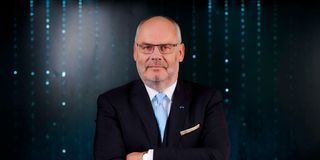Years under oppressive occupation makes us value freedom, progress

Estonia’s President Alar Karis.
What you need to know:
- As we celebrate Estonia’s Independence Day tomorrow, we call upon the international community to condemn Russia, a UNSC permanent member, for pursuing its aggressive and outrageous breach of the UN Charter by invading its neighbour, Ukraine.
- Entrepreneurship cannot thrive without freedom—to choose your destiny, whom you want to cooperate with and the alliances you want to be in. Hence our support to Ukraine.
- We strongly condemn any breach of international treaties, the UN Charter and the use of force to change a country’s borders. No totalitarian leader should get away with that.
From Estonia in the faraway north, I am witnessing a rapid transformation in Africa.
Digital solutions and green energy are opening up new opportunities and the African Continental Free Trade Area will increase pan-African trade and help in creating a single African digital market.
All this as innovative solutions in education help to provide future jobs. Kenya has made huge progress, for example, being the world leader in the digital payments platform M-Pesa.
These processes reflect similar transformations in the Baltic states in the 1990s. At 1.3 million, Estonia is the least populous country in the European Union with a population density of just 28.4 per square kilometre and 60 per cent of it is covered with forest.
And we are advanced in technology, especially digital public services. Our GDP per capita has risen to $21,707 from $3,584 in 1990. We have 10 unicorns—companies valued at over $1 billion. Normaalne, as we would say “not bad” in Estonia. Super good, as many others might say.
Legendary writer and traveller Ernest Hemingway once said you can find at least two Estonians in every port. True, Estonians have been in several corners of Africa—from the 17th Century, in the employment of the Swedish Africa Company in Cabo Corso on the Gulf of Guinea (now Ghana) to the 20th Century, when Leonhard Blumer lived in Arusha and compiled a Maasai spelling book.
Happily, I have a personal connection to Africa. While the national auditor-general, I shared Estonia’s experiences with Nigerian colleagues. In 2013, I signed an MoU at Unep, Nairobi, on behalf of environmental auditors. As a guest of the African Organisation of Supreme Audit Institutions, I visited Kinshasa.
Complicated history
Our nation has a complicated history. Estonia was occupied for centuries by several powers. Most recently, five decades were lost to the Soviet Union. When we restored our independence in 1991, we were a poor country with a small population and no natural resources to provide public wealth. Our only resource was our people!
How did we do it? First, education, internet to every school, and programming in curricula. Everyone must know how to use a computer and the internet must be a public good available for all. There are public areas where the internet is free of charge in every city and village.
Secondly, the creation of a paperless, zero bureaucracy public service that saves money and offers its services 24/7 in full transparency. Transparency International’s Corruption Perceptions Index ranks Estonia 13th out of 180 countries. You can apply for a new ID, passport, or driver’s licence online. With 99 per cent of government services online.
Thirdly, we respect human rights and freedoms in a modern democratic country, the dream of joining the EU and Nato has been the driving force for national reforms. We have experienced firsthand that totalitarian and authoritarian systems do not bring wealth to all. These highly corrupted systems keep everyone poor and repressed.
Another thing that we have in common with Africa is our entrepreneurial spirit. Our companies are active in the continent. The best-known is Bolt, which operates in eight African countries, providing a mobility super app to millions. Our IT companies have helped to build e-government solutions in Namibia, Benin and Nigeria, to name a few.
Our cooperation with Kenya is getting stronger. Together with other Team Europe partners, we are starting a large-scale project on human-centred digitalisation this year with Estonia providing expertise on building e-government systems based on its interoperability system X-Road. Last year, Estonia and Kenya signed an MoU in education.
Estonia has assisted the Kakuma refugee camp with skills development in agriculture, entrepreneurship and digital literacy and food assistance through UNCHR. We plan to host the first Estonian-African business forum in Tallinn in May focusing on digital transformation, green technologies and education.
But entrepreneurship cannot thrive without freedom—to choose your destiny, whom you want to cooperate with and the alliances you want to be in. Hence our support to Ukraine. We strongly condemn any breach of international treaties, the UN Charter and the use of force to change a country’s borders. No totalitarian leader should get away with that.
I deeply respect Kenya’s Ambassador to the United Nations, Mr Martin Kimani, who delivered the most profound and powerful speech at the UN Security Council, stating: “We believe all states formed from empires that have collapsed or retreated have many peoples in them yearning for integration with people in neighbouring states. This is normal and understandable. However, Kenya rejects such a yearning from being pursued by force.”
As we celebrate Estonia’s Independence Day tomorrow, we call upon the international community to condemn Russia, a UNSC permanent member, for pursuing its aggressive and outrageous breach of the UN Charter by invading its neighbour, Ukraine.
Mr Karis is the President of Estonia. [email protected]. @AlarKaris




